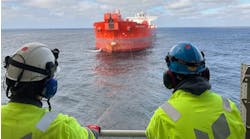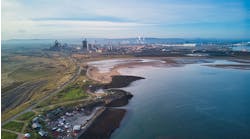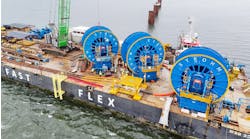Fred Akanni
Lagos
Shell's retrenchment sends jitters through Nigeria
Shell's plans to retrench one in every four workers in its Nigerian operations has spurred concerns in the country's oil patch. Workers' Unions in Mobil, Chevron, and other big operating companies are asking their respective managements to confirm if they have such a plan as Shell's, especially as Shell's announcement was something of a surprise.But the situations are different. Until 1997, Shell was producing 850,000-1,000,000 b/d of oil, averaging nearly half of Nigeria's total production. But heightened disturbances from people living in communities in Shell's areas of operations, coupled with the poor funding of operations by Shell's joint venture partner-state-owned NNPC - has forced production down to less than 700,000 b/d for much of this year. The collapse in the price of crude oil has caused NNPC to scale down its spending. This year, NNPC wants to spend $2 billion on servicing its joint venture obligations, whereas, the six joint venture partners - Agip, Chevron, Elf, Mobil, Shell, and Texaco - are asking for $3.7 billion.
The reduction in Shell's production has favored some competitors. Mobil has averaged 570,00 b/d of oil, in addition to 93,000 b/d of condensate, and Chevron is doing an average of 440,000 b/d of oil. These figures are less than what the companies planned to do for 1998, but Nigeria's reduction in OPEC quota has led to reining in of production. Even so, they would have been forced to produce less if Shell were not hampered by community activists who keep shutting in the company's pipelines.
Shell has had a recent history of staff cuts. Only in 1995, it asked a number of middle cadre staff to take voluntary retirement and gave each of them a package of incentives to do so. This was the second such act in 10 years, coming after the 1986 package, which was caused by the price drop. As of early February, the staff was skeptical that the incentives would be as much as the 1995 package. A Shell spokesman said that the forthcoming exercise will cut across all strata of employees, including expatriate staff, irrespective of gender, ethnicity, and religion. He said that the company had evolved a set of criteria which include those who voluntarily wish to retire and those to be retired compulsorily. Other staff to be affected are those who have performed poorly over a reasonably long period, those with low utility competence, and those who have reached the peak of their careers without further room for growth.
PGS shooting 3D in ultra-deepwater off Nigeria, Togo
The Norwegian seismic company, PGS, is currently acquiring the first 3D non-exclusive seismic data in Nigeria. The site of acquisition is in 10 leases, seven of which are in ultra-deepwater, offshore the Niger Delta, and three in the deepwater Benin Basin. Water depths are 1,000-2,500 meters. PGS secured the rights to acquire these open blocks from Nigeria's Department of Petroleum Resources, in what is seen as exercise of competitive advantage over Mabon, an indigenous Nigerian seismic company which has also expressed interest in the area.PGS is acquiring the data, even before it has enlisted the interest of potential buyers. Mabon doesn't readily have such equipment to shoot the survey in the water. It can only bring in contractors after it has obtained commitment from operators agreeing to purchase the data. It is the second time in six months that Mabon would be losing in the race to secure exclusive rights from government to acquire data in deepwater Nigeria. Late last year, it lost the bid to acquire 2D data over portion of the deepwater to Veritas.
PGS is utilizing the vessel M/V Ramform Explorer, with offset distance of a minimum 8,000 meters and binning of 12.5 meters by 25 meters. The sources are two by 3,090cu in. (109 bar-meter at each shot point; flip flop). Most of the data processing will be conducted on board the vessel, most likely up to DMO stack. Post-stack processing will take place either at PGS Tensor's facility in London or Houston.
PGS is acquiring the same kind of data in offshore Togo, where it is targeting the shelf and deepwater areas offshore (30-2,800 meters).
Vaalco continuing success in Gabon
Vaalco is continuing its winning streak in the Etame Marin tract with the successful conclusion of the Etame-2, drilled by Adriatic I, last January. There were no tests on the new well, but further appraisal drilling is planned for mid-summer 1999. The discovery well, Etame-1 was suspended at a TD of 8,030 ft Measured Depth, after testing 3,700 b/d in an oil filled, 40 feet sand encountered in the Gamba formation. The Etame block was awarded in 1995 for an initial three-year period, with a possible three-month extension if drilling was not completed. 385 sq km of 3D as well as 300 km of 2D seismic data was completed in June 1997.Valco operates the lease with 17.85%, a very low percentage equity relative to its partners: Baker Hughes 65%, Saol, 10%, Petrofields 4.53%, Alcorn 2.62%. Energy Africa has the option to participate with up to a 7.5% working interest in the development of any commercial discoveries made on Etame. It is to exercise this option on behalf of the Gabonese government. And, if it should choose to do so, it would reduce proportionally the interest of the other participants.
Shell confirms offshore quest
Shell Nigeria will be making more than a quarter of its total production offshore by 2002, if the current program proves successful. Shell Nigeria Exploration and Production Company, a wholly owned affiliate of Royal Dutch Shell, concentrates on deep offshore Nigeria and the rift system in the Benue Trough (onshore). The company is developing the 550 Million bbl Bonga Field and hopes to produce 200,000 b/d of oil from the field, located in a water depth of 1,000 meters, by late 2001. Meanwhile, the other affiliate, Shell Petroleum Development Company of Nigeria, is developing the EA Field, a shallow offshore field in the western part of the Niger Delta. It is proposed that EA will deliver at least 25,000 b/d of oil when it is put on stream latest 2001.The combined daily production from these two fields, 225,000 b/d of oil, is about a quarter of Shell's regular daily production of 850,000-mm b/d of oil. Shell has not been able to reach even the lower of these two figures in the last year, because of agitation from local communities in the vicinity of the company's oilfields. Shell currently makes the bulk of its Nigerian crude oil production on land. These communities have forced the company to shut in wells and fields, by cutting off flowlines and hijacking platforms, in demand for improved standard of living and higher ecological and environmental standards.
Ranger searches for more partners
Even after the Angolan government has approved its farm-out of 40% equity in offshore Block 4 to Occidental, the operator Ranger is seeking an additional partner to farm-in a further 10-15% from its remaining 40%. The farm-in deal with Occidental, first agreed upon in late 1997, was finally ratified and made effective at the end of 1998.Ranger is producing 15,000 b/d of oil and 6 MMcf/d of gas in the Kiame Field from the block, using the Ocean Producer MOPU. Last October, the operator plugged and abandoned a dry hole wildcat in the 5,000-sq km block, located in the Lower Congo Basin. The wildcat 4/21-5-1 was spudded in 328 meters of water and drilled to a planned TD of 1,875 meters. Ranger now retains 40% of the block, with Oxy's 40%, and Sonangol's 20%.
Copyright 1999 Oil & Gas Journal. All Rights Reserved.


